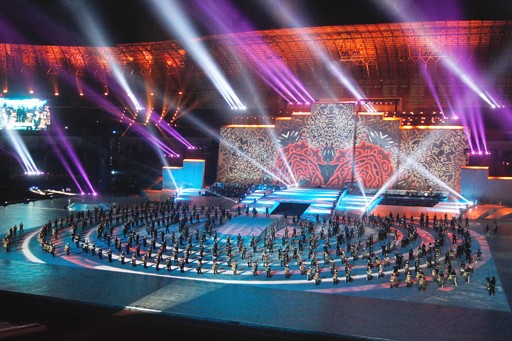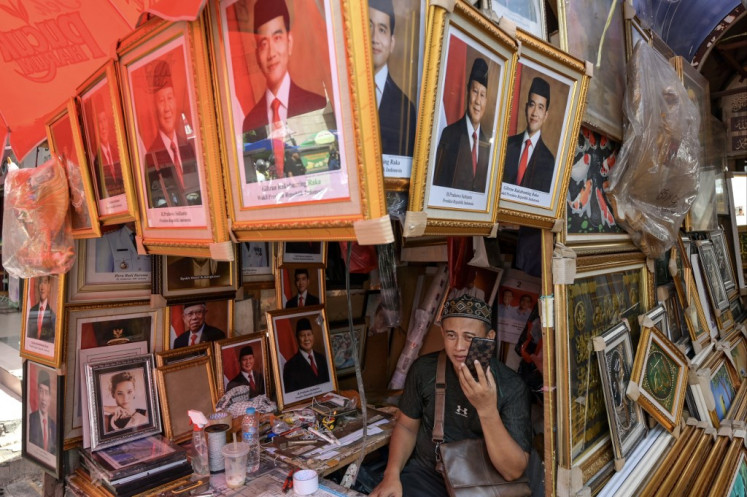COMMENTARY: In National Games sportsmanship is the loser
Change Size
 Spectacular show: Hundreds of dancers perform in the closing ceremony of the National Games at Gelora Bandung Lautan Api in Bandung, West Java, on Thursday. The show’s theme was “Harmony in Nusantara”. The next Games will be held in Papua in 2020. (JP/Arya Dipa)
Spectacular show: Hundreds of dancers perform in the closing ceremony of the National Games at Gelora Bandung Lautan Api in Bandung, West Java, on Thursday. The show’s theme was “Harmony in Nusantara”. The next Games will be held in Papua in 2020. (JP/Arya Dipa)
T
here are two narratives that encapsulate the just concluded 19th National Games (PON) in West Java. The first is the grand ambition of the host province, which was showcased in the event’s tagline “Jabar kahiji” or West Java (must be) number one.
The provincial administration spent a whopping Rp 2.3 trillion (US$184 million), mostly from its regional budget, to build 62 sport venues and supporting facilities, procure equipment and materials for 44 medal sports and 2,492 medals and cover lodging for the 9,533 athletes from 34 provinces who took part in the two-week event.
From the beginning, the host seemed to be taking its pledge of superiority seriously. The opening ceremony at the Gelora Bandung Lautan Api (GBLA) stadium was an extravagant welcome party that was marked with fireworks galore and colossal performances.
The organizers also transformed a hotel ballroom into a state- of-the-art media center for around 3,000 journalists from across the country. High-speed internet connection was available around the media center and shuttle buses serving the routes from hotels to sport venues.
West Java took the games seriously indeed and as the host it could have done what it takes to serve its thousands of guests.
Unfortunately, West Java failed to strike a balance between acting as a good host and championing sportsmanship as a competitor, which takes us to the second narrative.
As normally happens in competitions, a province is able to take advantage of being the host, such as by adding several medal events to indulge home athletes. But the privilege should stop there. When goals justify the means in sports, violations of ethics will be inevitable.
Only two days after PON opened, protests over poor refereeing in the judo competition erupted. The East Java team started the proverbial fire after the panel of referees opted to regroup for final scoring behind closed doors, which was an unusual move.
The next day, another argument over refereeing erupted, this time from the Jakarta karate team. Chief of the team Dody Rahmadi Amar questioned the referees’ choice of an IT-based drawing mechanism, which he said was prone to manipulation.
Disappointment with the way the competition was adjudicated then shifted to the boxing area. The East Kalimantan team cried foul at the defeat of its female boxer Wasti Hiskinda to host pugilist Sulvana.
East Kalimantan boxing organization chief Nasir Balfa said he did not see sportsmanship prevail in the ring, because referees always ruled in favor of the host. “Every time we play the home team the referees definitely rule in favor of the host,” he said.
The litany of protests over questionable refereeing continued in other sports. Head of the Jakarta in-line skating association Danny Buldansyah described the games this year as nightmare for the sport, not so much because of the refereeing, but also because the crowd’s pitch intervention, which he said could have been prevented had security regulations been enforced. One of the sources of protest was the absence of an automatic timer, Danny said.
Dozens of disputes marred the PON, putting the standard of refereeing and, hence, the competition itself, in doubt. A medal won through unfair play on the part of athletes or referees does not make a champion.
Unfortunately, West Java’s quest for victory was also tainted by supporters who resented the criticism toward their team. A reporter with local news portal Tribunnews, Zezen Zainal Mutaqien, received intimidation due to his news report about the government’s warning to the provincial administration over its lavish spending on the games. Not only Zezen, his wife also endured the same threats.
The police are investigating the case, but no suspect has been named so far.
The way the PON organizers addressed the disputes was far from showing willingness to settle the questions about fairness. While a number of organizing committee members insisted that complaints should be discussed in the team leaders’ meeting, which was held on a daily basis, other officials went into defense mode.
Interim chairman of the PON organizing committee Iwa Karniwa even regretted the conduct of the participating teams, which he said preferred to raise their complaints about the standard of refereeing in the press rather than solving the matter with the organizers.
Not just the competing teams, the public at large has the right to know whether a match is fixed or follows the rule of the game. Organizers of a competition do not only deal with administrative matters, but also bear the responsibility of maintaining sports values.
Fairness, accountability and integrity are all noble sporting values that athletes and sports lovers must defend. For an athlete, being number one is an achievement, but upholding sportsmanship is their source of pride. Sadly, politicians do not care.









